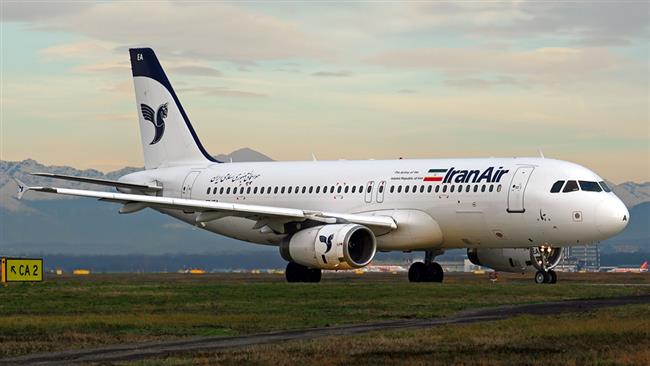Airbus deal to sell 100 planes to Iran at risk following Trumps decision to pull out of nuclear deal

An Airbus deal to sell 100 planes to Iran looks could be in danger following Donald Trump’s declaration today that he is pulling out of the Iran nuclear deal.
Iran agreed a long-term deal on its nuclear programme with the US, UK, France, China, Russia and Germany in 2015.
The deal came after years of tension over its nuclear programme which Iran claimed was for peaceful purposes, the international community was sceptical believing Iran was trying to build nuclear weapons.
Iran agreed to limit its nuclear activities and allow in international inspectors in return for the lifting economic sanctions as part of a deal.
After the Iran nuclear deal went into effect, Airbus signed a contract to sell Iran Air 100 planes at a list price of nearly £15 billion.
According the Wall Street Journal, Airbus executives believe that should Trump pull out of the nuclear deal Airbus will eventually lose their license to deliver the planes. Sales of Airbus jets are reliant on U.S. export licences because of the heavy use of U.S. parts
Boeing also agreed to sell up to 110 planes to Iran but as yet hadn’t taken the step of firming up the order.
According to news agency Reuters – Airbus has said it will study Trump’s decision to pull out of the Iran nuclear accord before responding.
“We’re carefully analysing the announcement and will be evaluating next steps consistent with our internal policies and in full compliance with sanctions and export control regulations,” Airbus communications chief Rainer Ohler said. “This will take some time,” he added.
Iran signed a formal deal with Airbus to buy 100 narrow body and wide body aircraft in December 2016, the deal covers 46 A320 Family, 38 A330 Family and 16 A350 XWB aircraft, wings for all the jets would be built in Broughton.
Deliveries were due to begin in early 2017 but only three planes have been delivered so far.
Following news this evening of President Trump’s decision to pull out of the Iran nuclear deal, Prime Minister Theresa May, German Chancellor Angela Merkel and French President Emmanuel Macron issued a joint statement;
“It is with regret and concern that we, the Leaders of France, Germany and the United Kingdom take note of President Trump’s decision to withdraw the United States of America from the Joint Comprehensive Plan of Action.
Together, we emphasise our continuing commitment to the JCPoA. This agreement remains important for our shared security. We recall that the JCPoA was unanimously endorsed by the UN Security Council in resolution 2231. This resolution remains the binding international legal framework for the resolution of the dispute about the Iranian nuclear programme. We urge all sides to remain committed to its full implementation and to act in a spirit of responsibility.
According to the IAEA, Iran continues to abide by the restrictions set out by the JCPoA, in line with its obligations under the Treaty on the Non-Proliferation of Nuclear Weapons. The world is a safer place as a result. Therefore we, the E3, will remain parties to the JCPoA. Our governments remain committed to ensuring the agreement is upheld, and will work with all the remaining parties to the deal to ensure this remains the case including through ensuring the continuing economic benefits to the Iranian people that are linked to the agreement.
We urge the US to ensure that the structures of the JCPoA can remain intact, and to avoid taking action which obstructs its full implementation by all other parties to the deal. After engaging with the US Administration in a thorough manner over the past months, we call on the US to do everything possible to preserve the gains for nuclear non-proliferation brought about by the JCPoA, by allowing for a continued enforcement of its main elements.
We encourage Iran to show restraint in response to the decision by the US; Iran must continue to meet its own obligations under the deal, cooperating fully and in a timely manner with IAEA inspection requirements. The IAEA must be able to continue to carry out its long-term verification and monitoring programme without restriction or hindrance. In turn, Iran should continue to receive the sanctions relief it is entitled to whilst it remains in compliance with the terms of the deal.
There must be no doubt: Iran’s nuclear program must always remain peaceful and civilian. While taking the JCPOA as a base, we also agree that other major issues of concern need to be addressed. A long-term framework for Iran’s nuclear programme after some of the provisions of the JCPOA expire, after 2025, will have to be defined. Because our commitment to the security of our allies and partners in the region is unwavering, we must also address in a meaningful way shared concerns about Iran’s ballistic missile programme and its destabilising regional activities, especially in Syria, Iraq and Yemen. We have already started constructive and mutually beneficial discussions on these issues, and the E3 is committed to continuing them with key partners and concerned states across the region.
We and our Foreign Ministers will reach out to all parties to the JCPoA to seek a positive way forward.”
Spotted something? Got a story? Email: [email protected]
Latest News
